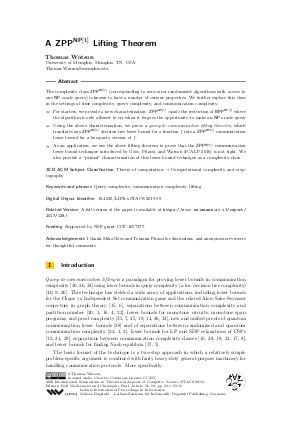@InProceedings{watson:LIPIcs.STACS.2019.59,
author = {Watson, Thomas},
title = {{A ZPP^NP\lbrack1\rbrack Lifting Theorem}},
booktitle = {36th International Symposium on Theoretical Aspects of Computer Science (STACS 2019)},
pages = {59:1--59:16},
series = {Leibniz International Proceedings in Informatics (LIPIcs)},
ISBN = {978-3-95977-100-9},
ISSN = {1868-8969},
year = {2019},
volume = {126},
editor = {Niedermeier, Rolf and Paul, Christophe},
publisher = {Schloss Dagstuhl -- Leibniz-Zentrum f{\"u}r Informatik},
address = {Dagstuhl, Germany},
URL = {https://drops.dagstuhl.de/entities/document/10.4230/LIPIcs.STACS.2019.59},
URN = {urn:nbn:de:0030-drops-102989},
doi = {10.4230/LIPIcs.STACS.2019.59},
annote = {Keywords: Query complexity, communication complexity, lifting}
}

 Creative Commons Attribution 3.0 Unported license
Creative Commons Attribution 3.0 Unported license




